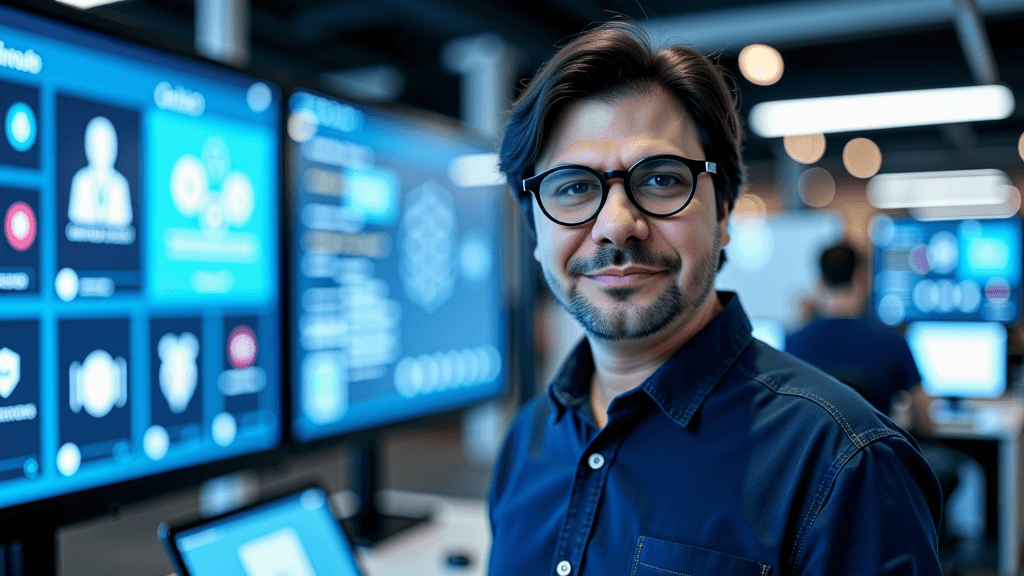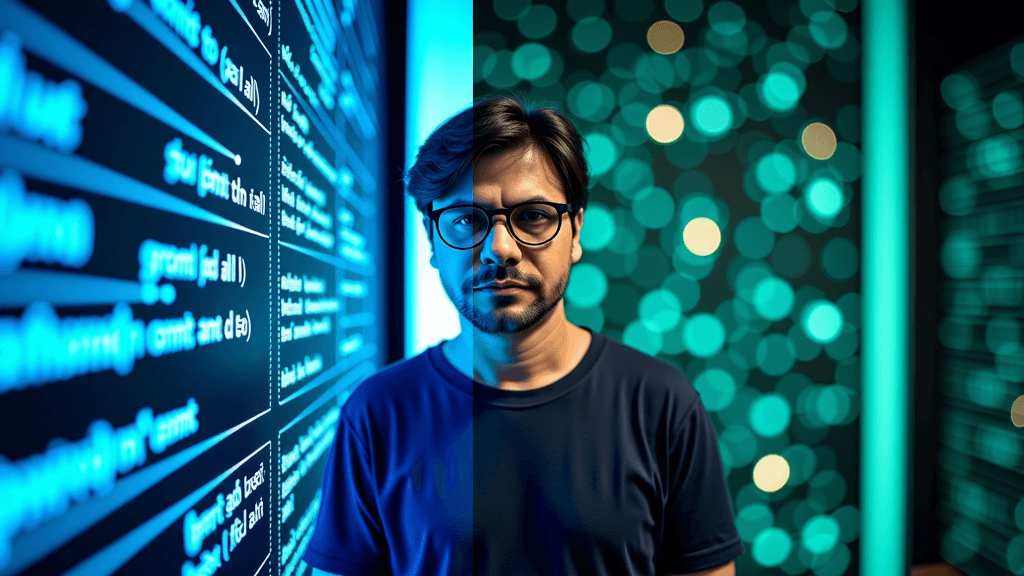AI Radar: From Legal Fraud to the Turing Test – The Paradox of AI in Brazil in 24h
April 26, 2025 | by Matos AI

The artificial intelligence landscape in Brazil continues to transform rapidly, with developments that show both the promise and the dangers of this emerging technology. Over the past 24 hours, we’ve seen everything from alarming cases of AI misuse in the legal field to predictions about how this technology could transform the way we work.
AI in the Judiciary: From Innovation to Fraud
An emblematic case emerged this week when the 1st Criminal Chamber of the TJ/PR rejected an appeal filed by the defense of a defendant after discovering that the document was generated by artificial intelligence – with a worrying aggravating factor: the system created 43 legal precedents. completely non-existent.
Second report from Migalhas, the rapporteur, judge Gamaliel Seme Scaff, described the document as “textual chaos” and severely criticized the defense for attempting to mislead the panel.
Join my WhatsApp groups! Daily updates with the most relevant news in the AI world and a vibrant community!
- AI for Business: focused on business and strategy.
- AI Builders: with a more technical and hands-on approach.
This case perfectly illustrates what I have been warning about in my lectures and consultancies: generative AI, when used without proper supervision, can become a dangerous tool for disinformation. In the legal field, where accuracy and truthfulness are fundamental pillars, this practice represents a threat to the very integrity of the system.
The Final Test: AI Passing as Human
Meanwhile, a historic milestone has been reached in the development of AI: for the first time, an artificial intelligence model has managed to significantly deceive human evaluators in the famous Turing Test.
According to study released by CNN Brasil, OpenAI’s GPT-4.5 model managed to fool 73% of participants into believing they were talking to a human being. The research was conducted at Cornell University and, although it has yet to undergo peer review, it points to a new era in the evolution of AI.
THE VEJA magazine also addressed the topic, highlighting the ethical and practical implications of this development. When artificial systems become indistinguishable from humans, we enter a whole new territory of questions about identity, authenticity and trust in digital interactions.
The Transformation of Work by AI
In the corporate world, impressive data is emerging about how AI can transform our productivity. According to Google research cited by CNN Brazil, workers can save 122 hours per year by using AI tools to automate administrative tasks. That’s equivalent to almost three weeks of work returned to professionals.
The promised efficiency is impressive, but it is crucial to understand that it is not about simply adopting tools, but rather creating integrated strategies for implementing AI in workflows. Proper training of teams is mentioned in the study as a fundamental factor for the success of this transformation.
Complementing this vision, the Hardware.com.br presented an overview of the five AI tools that promise to turbocharge productivity by 2025, including ChatGPT Enterprise, Claude Opus, Microsoft Copilot Pro, Midjourney V8 and Perplexity AI.
The Future of Jobs: Warning or Opportunity?
The most anxiety-provoking issue when we talk about AI continues to be its impact on jobs. StartSe published an article citing predictions from the World Economic Forum that 22% of current jobs will be impacted by 2030, with the possibility of 92 million jobs disappearing globally.
I have been working extensively with organizations to navigate this transition. My view is that we are facing a transformation, not a simple replacement. Professions that rely exclusively on repetitive tasks, such as bank tellers and administrative assistants, are the most vulnerable, but new opportunities are emerging for those who know how to adapt.
In my consulting and mentoring work with companies, I have observed that organizations that view AI as a partner, not a replacement, are able to create new business models where humans and machines work in synergy – expanding capabilities rather than simply cutting costs.
The AI Personal Agent: The Future of Human-Machine Interaction
A fascinating perspective was presented by OpenAI’s head of products, Olivier Godement. According to the State, Godement envisions a future where each person will have their own personal AI agent, acting as a personalized assistant to enhance productivity and facilitate daily tasks.
This prediction converges with what the OpenAI is developing, according to a report by Olhar Digital: a completely open AI model, capable of connecting with other systems to solve complex tasks.
In my consulting projects on the future of work and digital transformation, I have emphasized that we are evolving into an ecosystem of intelligences – human and artificial – working in a complementary way. The most successful organizations will be those that can orchestrate this collaboration efficiently.
Emotional Dependence and Risks of Interactions with AI
A worrying aspect emerged in the report of UOL about chatbots and the increasing ease of creating personalized virtual assistants. With platforms like Meta’s AI Studio, you can create a chatbot based on a public figure in just 15 seconds.
The problem is that these systems are increasingly sophisticated in simulating emotions and creating emotional bonds with users. Studies cited in the article indicate that this type of interaction can generate emotional dependence and even worsen feelings of loneliness.
This is an important reminder that as we develop and adopt AI technologies, we need to consider not only their economic impact, but also their psychological and social implications. In my AI talks, I always emphasize the importance of the human component—the “A” for Affect in CACACA (Creativity, Autonomy, Collaboration, Adaptability, Connection, and Affection), the six essential skills for the future of work that I have been advocating.
Regulation of AI in the Financial Market
In the financial sector, the discussion about AI regulation takes on special contours. The Valor Econômico published an analysis on the application of AI in resource management and the regulatory challenges in this field.
The article highlights the need for an AI Legal Framework in Brazil that takes into account the specificities of the financial sector. Something I have advocated in my participation in discussion forums on public policies is the importance of balanced regulation – protecting rights and mitigating risks without stifling innovation.
AI in Conflict: The Ethical Dilemma
Finally, one of the most sensitive topics addressed in recent news concerns the use of AI in military contexts. Olhar Digital reported how Israel has used artificial intelligence in conflicts, raising serious ethical questions about surveillance and the use of technology in warfare.
This case reminds us that technological development is never neutral and that we need to have open and transparent discussions about the ethical limits of the application of AI, especially in sensitive contexts such as armed conflicts.
Conclusion: Navigating the AI Paradox
The news landscape of the last 24 hours presents us with a true paradox: the same technology that can positively revolutionize our work and create intelligent personal assistants can also be used to manufacture false jurisprudence or generate emotional dependence.
My experience working in technology and innovation for over two decades has taught me that there are no simple solutions to complex challenges. AI is not inherently good or bad – it is a powerful tool whose impacts depend on how we choose to develop, regulate and use it.
For organizations navigating this landscape, I recommend three core principles:
- Strategic adoption: Incorporate AI not as a mere replacement for existing processes, but as a catalyst for transformation and value creation
- Human supervision: Ensure that AI tools operate under proper oversight, especially in critical areas such as law and healthcare
- Development of complementary skills: Investing in the skills that make us uniquely human – creativity, critical thinking, empathy and the ability to connect
In my mentoring work with startups and companies, I have helped organizations implement these principles in practical ways, developing strategies to harness the potential of AI while strengthening human capital.
We are living at a critical moment in the evolution of technology and society. The choices we make today will shape not only our businesses, but the very future of work and human relationships. We face a complex challenge, but also an extraordinary opportunity to build a future where technology and humanity enhance each other.
✨Did you like it? You can sign up to receive 10K Digital's newsletters in your email, curated by me, with the best content about AI and business.
➡️ Join the 10K Community here
RELATED POSTS
View all



